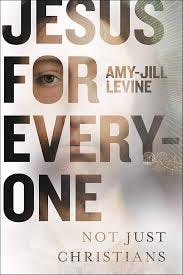Jesus is the Question?
How Jesus calls us to cultivate curiosity in a world of certainty.
Over the last few weeks of 2024, there were no shortage of lists offered by various authors, organizations, and influencers of their top books of the year. Usually, I will open these articles, skim the content, and then go on with my life; however, on December 10th, Scot McKnight wrote a Substack article entitled 2024 Book of the Year. (You can find the article here.) I have long been an admirer from afar of McKnight’s work, but I was amazed to see that his favorite book of the year was a book I had never heard of written by an author I had never heard of as well. (I am very aware that this is likely due to my own lack of reading widely in certain areas.)
I quickly bought Amy-Jill Levine’s book, Jesus for Everyone: Not Just Christians. I’m a sucker for a provocative title, and this book fits the bill perfectly. Within the first few pages, I was amazed as Levine, an non-believing Jewish New Testament scholar, shared her own background of coming to the Scriptures. The book tackles various hot button issues and topics from the perspective of the historical Jesus. I will likely write a more thorough book review in the coming weeks, but suffice it to say that there are conclusions that Levine draws that I find compelling. Others I find less so.
In all of this, there has been a phrase that Levine uses over and again that has arrested my attention and given me a new lens through which to view, understand, and appreciate Jesus’ ministry. The phrase: “Jesus helps us ask all the right questions.”1
“Jesus helps us ask all the right questions.”
I don’t know about you, but I have heard throughout my life that Jesus is the answer. I understand what people typically mean by this. They mean that Jesus has the power and ability to help conquer and overcome life’s biggest issues, concerns, and struggles. They mean that Jesus has the ability to take the places of hurt, pain, chaos, and brokenness in our lives and make them whole again. To this, I wholeheartedly believe.
However, there is a faction of the church that seems to espouse a way of looking at Jesus specifically, and the Bible generally, as having a specific answer to every modern issue, circumstance, and problem that arises. Ignoring original context, cultural background, and our own inability to fully remove ourselves from our own cultural baggage, these individuals pluck verses, irregardless of context, in order to offer the certainty of a pointed answer to every contemporary issue the world may be facing.
Enter the Jesus as described through the Gospels, the man who is “the way, the truth, and the life” (John 10:10) and yet answers people’s questions of how to understand God’s point of view on the contemporary issues of his day more often with questions than with pointed, specific answers. When Jesus doesn’t offer a question in return, his typical response is to tell a parable, which usually effective in creating additional questions for the listener to wrestle with. Jesus may well be the answer, but his ministry is full of questions.
If we have eyes to see it, this offers us a new and important lens through which to view Jesus, the Gospels, and our own faith. Instead of building our faith on certitude built upon proof texts, what might it look like if we learned to ask more questions? What might it look like if we were content to have Jesus’ parables and teachings offer us “all the right questions” without the certainty of easy answers? What if the posture of our faith moved from certitude (which requires very little faith since one is so sure of everything) to a spirit of curiosity asking the questions of where, what, and how God might be working at any given moment?
In all of this, I am reminded of the old adage that you can’t get to the right answers without asking the right questions first. May our reading, understanding, and appreciation of Jesus in the coming year be built out of asking the right questions as we live into a Christlike curiosity in the world.
Amy-Jill Levine, Jesus for Everyone: Not Just Christians (New York, NY: HarperOne, an imprint of HarperCollinsPublishers, 2024), 142.


